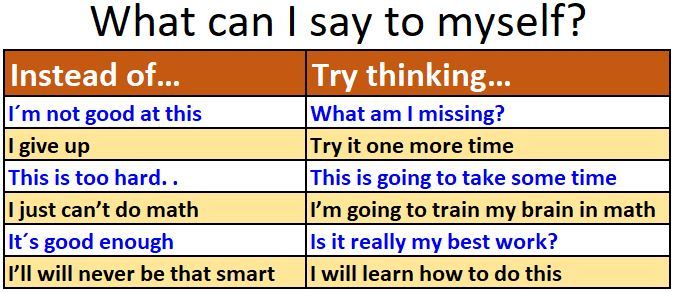There are people who believe that intellectual ability is immutable (fixed intelligence). These people make self-reflections such as the following: “I am not sure I can do it? Maybe I do not have the talent needed”. Or: “What happens if I cannot? It will be a failure.” People will laugh at me because I could not achieve it. They will call me a looser”.
Personally, as a math teacher, many times I have heard phrases like the following: “ I’ve always been bad at math”;“ I’m scared, and I am sure I will fail the class”; “I can never approve math because I was not born for it”, No matter what I do, I will fail math”; or “You have to be very smart to approve math.” They are students who are considered defeated from the beginning, and therefore do not put all their effort to overcome their shortcomings and limitations.
The renowned Stanford psychologist, Carol Dweck, proposed more than 20 years ago the theory that we know as Growth Mindset, “the mentality of the possible”. People with a Growth Mindset think: “I can learn anything that I want to”, “I can always improve”, “Mistakes help me learn”, “I’m a problem solver”, “I never give up”, “I like to challenge myself”
She thinks that intelligence can be developed. It is a very simple theory that proposes that, if the student recognizes errors as normal, and accepts them as part of the learning process; if he understands that in every activity of life, perseverance and tenacity are required in order to learn new things, then the student will be successful in his studies and in life.
Developing a growth mindset with students creates in them a love of learning and a resilience. As teachers, we must foster in our students the development of a growth mentality. We must use positive reinforcement and let know to our students, as often as possible, that we know they can succeed. We must instill in our students that they can improve their academic performance as much as they wish and overcome all the future challenges of their lives.
Aristotle said, “You are what you repeatedly do.” Therefore, excellence ought to be a habit, not an act.
I remember when I was a kid that my dad bought me a bicycle, and he started teaching me how to use it. Since I was very young, in the first or second fall I tried to give up, and I did not even want to touch the bike. I remember that my dad told me: “just by practicing you will learn and then you will really enjoy it”. His words were really wise, among the best memories of my childhood were those years I spent enjoying riding the bicycle. Driving a bicycle is a skill that we have to build with attempts and failures with dedication and perseverance. The same happens with school learning. Nobody is born knowing everything. We really learn something new every day if we insist on doing it. Mastering any skill requires practice, perseverance and learning from mistakes.
If you’re going to do a job, do it right…Good enough isn’t good enough if it can be better, and better isn’t good enough if it can be best.

